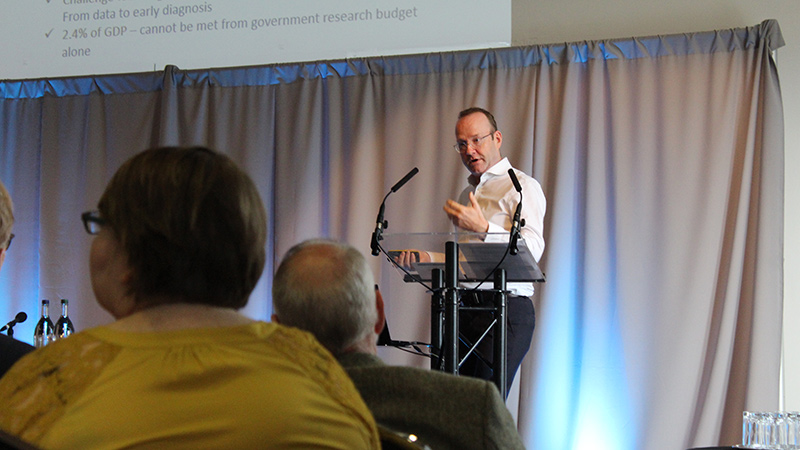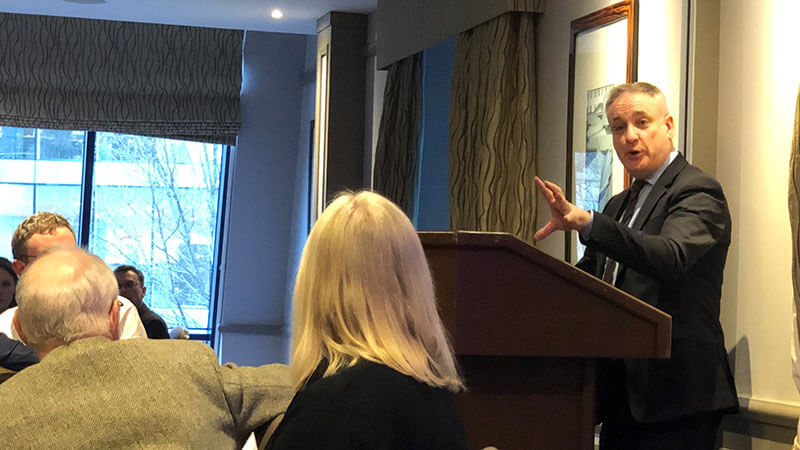Published:

Leading academics from Heriot-Watt University, gathered in central Edinburgh yesterday (Tues April 2) to discuss new ideas in healthcare photonics with cross-sector representatives.
Funded by the Scottish Funding Council and organised by the Research Futures Academy, the event, named The Optical Imaging Crucible, is part of Heriot-Watt's Health Innovation and Technologies (HIT) Research Festival. The two-day health conference celebrated the University's achievements in the health technologies sector.
The Crucible marks the first joint project between the Scottish Universities Life Sciences Alliance (SULSA), the Scottish Universities Physics Alliance (SUPA) with SINAPSE (Scottish imaging network: a platform for excellence) and included participants from all of the Scottish research-led universities, the NHS, as well as prominent industry leaders. The consortium lead scientist was Professor Rory Duncan.
I am consistently amazed by the ways in which scientists in Scotland are forging ahead in technologies with the potential to transform the way we live.
Held in Dynamic Earth, the workshop attracted delegates and speakers from across the world, representing academia, industry and public bodies. The assembled group of around 55 delegates enjoyed sessions led by various high-profile speakers including from the University of California, Berkeley and the Stanford Photonics Research Centre. Discussions were centred on the topic of innovation in optical imaging for health and how the Scottish and UK life science and health sectors can learn from the innovation ecosystem in the West Coast of the United States.
Optical imaging is a technique where researchers or clinicians can look inside cells or patients in a non-invasive manner, using light. This is needed to study or analyse cells and molecules for research, diagnostics and therapies, and thriving innovation pipeline uniting fundamental research with translation is essential to drive the future technologies global societies need. In Scotland, the photonics sector is currently generating £10Bn annually, predicted to grow to £30Bn by 2030. The Scottish Government strategy is to grow the life science sector to £8Bn annually by 2025.
The technology also holds tremendous benefits to business where several high-profile medical technology exports have emerged from Scotland's Higher Education research base and commercial life science sector.
Dr Gillian Murray, Deputy Principal (Enterprise and Business), attended the event and said afterwards: “Heriot-Watt University has a long-standing reputation in multi-disciplinary innovation in this area, having established the Life Science Interface Laboratory where we collaborate with a range of international researchers across disciplines as well as with industry. This has led to a cluster of award-winning start-up and spin-out companies in the broader healthcare area for Heriot-Watt.
“Today's workshop provided an outstanding opportunity for a number of key discussions to be held and helped forge new pathways for academics and industry to work effectively together across traditional boundaries.”

In the evening, Richard Lochhead MSP, the Minister for Further Education, Higher Education and Science, joined delegates and invited guests at a reception to promote Scotland's world-leading reputation in education, research and science.
Afterwards, Mr Lochhead, said: “I am consistently amazed by the ways in which scientists in Scotland are forging ahead in technologies with the potential to transform the way we live. The optical imaging technology being explored by scientists and researchers has great potential for improving disease prevention, diagnosis and treatment. The joint initiative by the research pools is just one example of how cutting edge research funded by the Scottish Government, through the Scottish Funding Council, is bringing together universities and industry to encourage collaboration across the country and internationally.
“We will continue to protect Scotland's interests in the challenging and uncertain future that EU exit brings with it. The talent we have here in Scotland has huge potential to meet these challenges and we remain an open and welcoming country to students, researchers staff and their families from other countries.”
The HIT Research Festival celebrates Heriot-Watt's achievements in the health technologies sector and is part of the university's Year of Health campaign. The Festival features an exceptional mix of inspiring academics, patients, charity representatives and funders.
In 2019, Heriot-Watt is celebrating its Year of Health, a calendar of engagement that spans schools, communities, businesses and government. Throughout the year, the campaign will highlight the university's research and the ground-breaking discoveries that are helping drive innovations in healthcare, diagnosis and treatment.